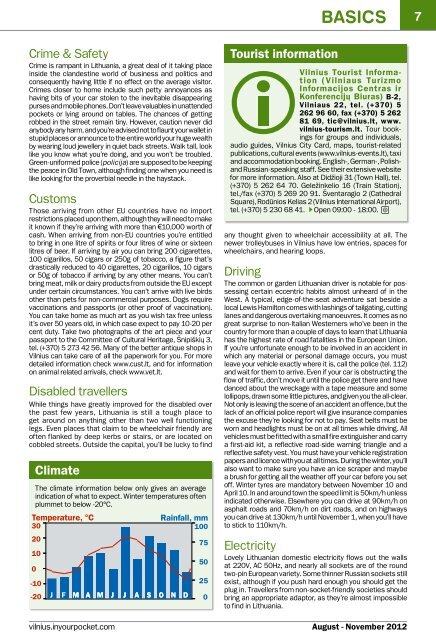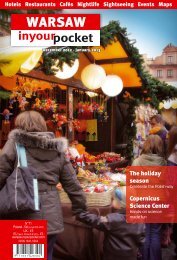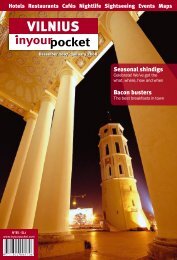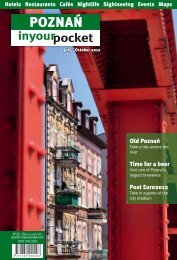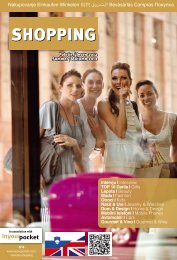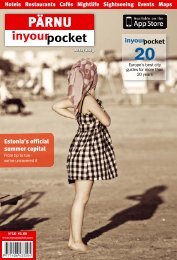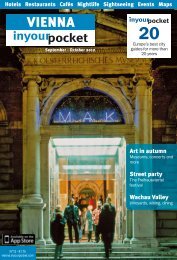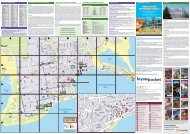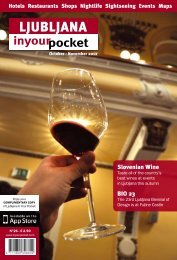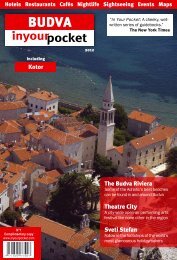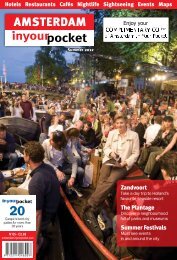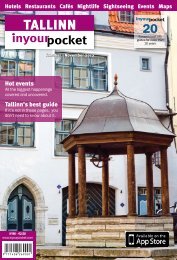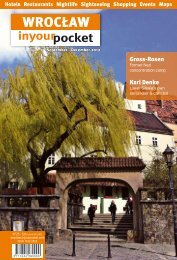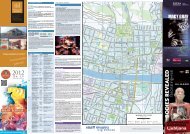VILNIUS - In Your Pocket
VILNIUS - In Your Pocket
VILNIUS - In Your Pocket
You also want an ePaper? Increase the reach of your titles
YUMPU automatically turns print PDFs into web optimized ePapers that Google loves.
Crime & Safety<br />
Crime is rampant in Lithuania, a great deal of it taking place<br />
inside the clandestine world of business and politics and<br />
consequently having little if no effect on the average visitor.<br />
Crimes closer to home include such petty annoyances as<br />
having bits of your car stolen to the inevitable disappearing<br />
purses and mobile phones. Don’t leave valuables in unattended<br />
pockets or lying around on tables. The chances of getting<br />
robbed in the street remain tiny. However, caution never did<br />
anybody any harm, and you’re advised not to flaunt your wallet in<br />
stupid places or announce to the entire world your huge wealth<br />
by wearing loud jewellery in quiet back streets. Walk tall, look<br />
like you know what you’re doing, and you won’t be troubled.<br />
Green-uniformed police (policija) are supposed to be keeping<br />
the peace in Old Town, although finding one when you need is<br />
like looking for the proverbial needle in the haystack.<br />
Customs<br />
Those arriving from other EU countries have no import<br />
restrictions placed upon them, although they will need to make<br />
it known if they’re arriving with more than €10,000 worth of<br />
cash. When arriving from non-EU countries you’re entitled<br />
to bring in one litre of spirits or four litres of wine or sixteen<br />
litres of beer. If arriving by air you can bring 200 cigarettes,<br />
100 cigarillos, 50 cigars or 250g of tobacco, a figure that’s<br />
drastically reduced to 40 cigarettes, 20 cigarillos, 10 cigars<br />
or 50g of tobacco if arriving by any other means. You can’t<br />
bring meat, milk or dairy products from outside the EU except<br />
under certain circumstances. You can’t arrive with live birds<br />
other than pets for non-commercial purposes. Dogs require<br />
vaccinations and passports (or other proof of vaccination).<br />
You can take home as much art as you wish tax free unless<br />
it’s over 50 years old, in which case expect to pay 10-20 per<br />
cent duty. Take two photographs of the art piece and your<br />
passport to the Committee of Cultural Heritage, Šnipiškių 3,<br />
tel. (+370) 5 273 42 56. Many of the better antique shops in<br />
Vilnius can take care of all the paperwork for you. For more<br />
detailed information check www.cust.lt, and for information<br />
on animal related arrivals, check www.vet.lt.<br />
Disabled travellers<br />
While things have greatly improved for the disabled over<br />
the past few years, Lithuania is still a tough place to<br />
get around on anything other than two well functioning<br />
legs. Even places that claim to be wheelchair friendly are<br />
often flanked by deep kerbs or stairs, or are located on<br />
cobbled streets. Outside the capital, you’ll be lucky to find<br />
Climate<br />
The climate information below only gives an average<br />
indication of what to expect. Winter temperatures often<br />
plummet to below -20°C.<br />
Temperature, °C<br />
30<br />
20<br />
10<br />
0<br />
-10<br />
-20<br />
J<br />
vilnius.inyourpocket.com<br />
Rainfall, mm<br />
100<br />
F M A M J J A S O<br />
N<br />
D<br />
75<br />
50<br />
25<br />
0<br />
Tourist information<br />
BasiCs<br />
Vilnius Tourist <strong>In</strong>formation<br />
(Vilniaus Turizmo<br />
<strong>In</strong>formacijos Centras ir<br />
Konferencijų Biuras) B-2,<br />
Vilniaus 22, tel. (+370) 5<br />
262 96 60, fax (+370) 5 262<br />
81 69, tic@vilnius.lt, www.<br />
vilnius-tourism.lt. Tour bookings<br />
for groups and individuals,<br />
audio guides, Vilnius City Card, maps, tourist-related<br />
publications, cultural events (www.vilnius-events.lt), taxi<br />
and accommodation booking. English-, German-, Polish-<br />
and Russian-speaking staff. See their extensive website<br />
for more information. Also at Didžioji 31 (Town Hall), tel.<br />
(+370) 5 262 64 70. Geležinkelio 16 (Train Station),<br />
tel./fax (+370) 5 269 20 91. Šventaragio 2 (Cathedral<br />
Square), Rodūnios Kelias 2 (Vilnius <strong>In</strong>ternational Airport),<br />
tel. (+370) 5 230 68 41. QOpen 09:00 - 18:00. J<br />
any thought given to wheelchair accessibility at all. The<br />
newer trolleybuses in Vilnius have low entries, spaces for<br />
wheelchairs, and hearing loops.<br />
Driving<br />
The common or garden Lithuanian driver is notable for possessing<br />
certain eccentric habits almost unheard of in the<br />
West. A typical, edge-of-the-seat adventure sat beside a<br />
local Lewis Hamilton comes with lashings of tailgating, cutting<br />
lanes and dangerous overtaking manoeuvres. It comes as no<br />
great surprise to non-Italian Westerners who’ve been in the<br />
country for more than a couple of days to learn that Lithuania<br />
has the highest rate of road fatalities in the European Union.<br />
If you’re unfortunate enough to be involved in an accident in<br />
which any material or personal damage occurs, you must<br />
leave your vehicle exactly where it is, call the police (tel. 112)<br />
and wait for them to arrive. Even if your car is obstructing the<br />
flow of traffic, don’t move it until the police get there and have<br />
danced about the wreckage with a tape measure and some<br />
lollipops, drawn some little pictures, and given you the all-clear.<br />
Not only is leaving the scene of an accident an offence, but the<br />
lack of an official police report will give insurance companies<br />
the excuse they’re looking for not to pay. Seat belts must be<br />
worn and headlights must be on at all times while driving. All<br />
vehicles must be fitted with a small fire extinguisher and carry<br />
a first-aid kit, a reflective road-side warning triangle and a<br />
reflective safety vest. You must have your vehicle registration<br />
papers and licence with you at all times. During the winter, you’ll<br />
also want to make sure you have an ice scraper and maybe<br />
a brush for getting all the weather off your car before you set<br />
off. Winter tyres are mandatory between November 10 and<br />
April 10. <strong>In</strong> and around town the speed limit is 50km/h unless<br />
indicated otherwise. Elsewhere you can drive at 90km/h on<br />
asphalt roads and 70km/h on dirt roads, and on highways<br />
you can drive at 130km/h until November 1, when you’ll have<br />
to stick to 110km/h.<br />
Electricity<br />
Lovely Lithuanian domestic electricity flows out the walls<br />
at 220V, AC 50Hz, and nearly all sockets are of the round<br />
two-pin European variety. Some thinner Russian sockets still<br />
exist, although if you push hard enough you should get the<br />
plug in. Travellers from non-socket-friendly societies should<br />
bring an appropriate adaptor, as they’re almost impossible<br />
to find in Lithuania.<br />
August - November 2012<br />
7


